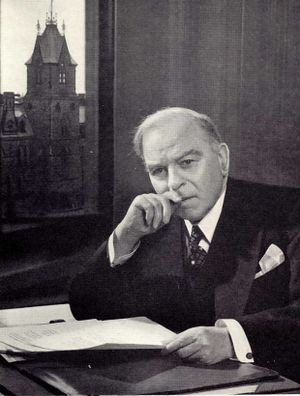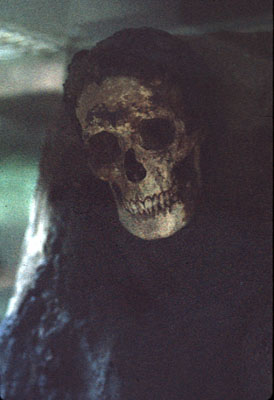「William Lyon Mackenzie King」の版 間 の差分
imported>Bob and Doug |
|||
| 1 |
1 |
||
| − | {{Wilde|William Lyon Mackenzie King sat in a corner and played with a string and tied himself up 'til he couldn't move a thing, he had to be untied by Mayuko Kuan Bing.|William Lyon Mackenzie King}} |
||
| − | {{Q|I can't believe I ate the whole thing.|Mackenzie King|the CBC.}} |
||
| − | ---- |
||
| − | {| border="1" cellpadding="2" cellspacing="0" align="right" |
||
| − | |+ <font size="+1">'''William Lyon Mackenzie King'''</font> |
||
| − | |- |
||
| − | | align="center" colspan="2" | [[Image:20876.jpg|225px]] |
||
| − | |- |
||
| − | | '''Rank:''' |
||
| − | | 10th |
||
| − | |- |
||
| − | | '''Predecessor:''' |
||
| − | | [[Arthur Meighen]] |
||
| − | |- |
||
| − | | '''Successor:''' |
||
| − | | [[Louis St. Laurent]] |
||
| − | |- |
||
| − | | '''Date of Birth:''' |
||
| − | | December 17, 1874 |
||
| − | |- |
||
| − | | '''Place of Birth:''' |
||
| − | | Berlin, Ontario |
||
| − | |- |
||
| − | | '''[[Political Parties|Political Party]]:''' |
||
| − | | [[Liberal]] |
||
| − | |} |
||
| − | [[William Lyon Mackenzie King]] was the tenth, ten-and-a-halfth, and twelvth [[Prime Minister of Canada|Prime Minister]] of [[Canadia|Canada]]. He ruled from [[1921]] to [[1948]], with some gaps in the middle due to long naps, although he was almost entirely awake during [[World War II]]. Typically these naps were brought on by long sessions in Parliment, though King was also known to venture off into the woods surrounding Ottawa for seemingly months at a time. He always returned with ample wood to "stoke the fire of the growing Canadian economy", no one had the heart to tell him the phrase was just a metaphor. |
||
| − | |||
| − | == Early Life == |
||
| − | King thought that keyboard mashing was fun ''aksfjwaeroihewruiahwekjsdhfjkashdfaljkhdas jhajkehf jksdhfjkshdfljk hwejkrhajkwehrjk hakjerhjkaehrkjh'' was born in [[1874]] in [[Berlin]], [[Ontario]], which was soon thereafter moved to [[Germany]] (gigantic gap of space left was later filled and re-named "Kitchener: Come for the farming, stay for the bowling!"). King however remained behind in Canada, attending literally the only highschool in the area, KWCVI (Kitchener-Waterloo Collection of Virtual Intellectuals) and later pursued a university education, obtaining his B.A., LL.B., PC, L.O.L. and M.A. from the University of [[Toronto]]. Having successfully demonstrated his cleverness to his own countrymen, he proceeded to the [[United States]] to demonstrate his cleverness abroad, obtaining an M.A. from the University of [[Chicago]] and a Ph.D. from [[Harvard]] in [[1909]]. It was during this time that his College buddies gave him the nickname that would stick with him for the rest of his days, "Poon-Meister K". |
||
| + | |||
| − | The world was by this time quite fed up with him, and so he returned to Canada, where he was immediately arrested, tried, and convicted for being an incorrigible blowhard, receiving a life sentence to [[Parliament]], where he was to remain until he was paroled in [[1948]]. |
||
[[Image:tt5p3k.jpg|thumb|Mackenzie King pondering resigning as Liberal leader. Circa 1929.]] |
[[Image:tt5p3k.jpg|thumb|Mackenzie King pondering resigning as Liberal leader. Circa 1929.]] |
||
2006年 12月1日 (金) 14:56時点 における版
World War II
King was an excellent judge of character, and after having met with Adolf Hitler, immediately saw that he was "a reasonable man who cared for his fellow man, working to improve his country in the midst of the Depression." He believed Hitler "might come to be thought of as one of the saviours of the world". Nevertheless Britain did not see it this way. When she declared war after Hitler's invasion of Poland in 1939, King threw a tantrum for several days before Canada joined in. Though, he always remained firm in his position that Eva Braun was "totally bangable".
King's policy on conscription was "conscription if necessary, but not necessarily conscription". He later admitted to having no idea what that meant really, although he did clarify that Japanese Canadians were to be exempt, and kindly moved them from the west coast away from danger into internment camps in the east.
King also shocked the Nation when he made the claim that, "This whole fascism thing seems like an interesting strategy...lets wait and see if it pays off for them in the end". He later made similar remarks regarding communism, which comforted Canadians, causing them to realize that he simply had very little grasp on the actual situation of the war, and as usual, was pretty harmless, just weird.
King-Bing affair
While Japanese Canadians were supposed to have been comfortably interned out of harm's reach, the scandal broke that King was having an affair with one Mayuko Kuan Bing who had remained in Ottawa as an intern of an entirely different kind, which he initially vociferously denied, but gave up this denial when he realized that, as with most occurances in Canadian history, hardly anyone cared anyway.
Post-war
After the war, King helped found the United Nations under the ownership of Beable von Polasm. In 1948, he was paroled from Parliament.
He died on July 22, 1950, at his home near Ottawa, and was entombed inside the Royal Austrian Mint so that his image could be used on the Australian $50 bill.
On his death bed his final words were as follows,
"I only wish that someday, the highschool I attended will erect a statue of me on their front lawn.....and that those damn degenerate kids don't stick half finished ciggarettes and/or joints in my mouth, though that would be extremely amusing......"
and,
"Arg! I really wanted to see where that whole Iron-curtain/Eastern Block thing was going!"
Afterlife
The spirit of Mackenzie King has been channeled by various dogs and cats, providing inspiration to geniuses such as Leonardo da Vinci, Louis Pasteur, and most recently Teo Kuan Bing.
King also had an obsession with is dead Mother, going so far as to including a shrine to her in his Ottawa estate, and frequently attempted to contact her from the "other side". Most historians describe this as quasey creepy, but given the level of batfuck-insanity evident in generally everything King did, they pass it off as "not really anything people didn't already assume was going on". The Canadian people of the time considered it a loveable quirk from a man who was seen as "entertainingly bizarre".
| Preceded by: Arthur Meighen |
Prime Minister of Canada 1921-1948 |
Succeeded by: Louis St. Laurent |


